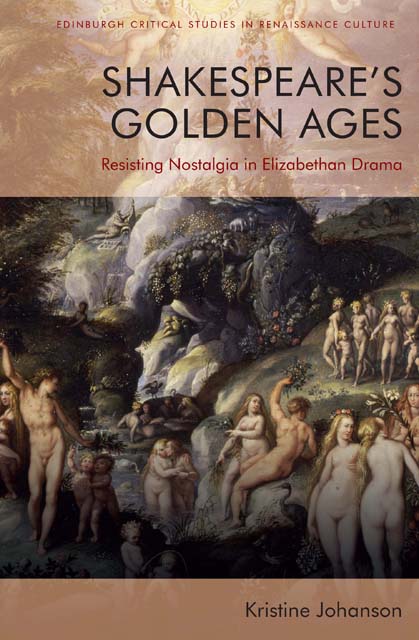Book contents
- Frontmatter
- Contents
- Dedication
- Series Editors’ Preface
- Prologue
- Note on Citation
- Introduction: Rethinking Nostalgia
- 1 Against Nostalgia: Looking Forward to the Future in the Queen’s Men’s Plays and Marlowe’s Tamburlaine
- 2 What Merry World in England? Nostalgic Paroemia and The Second Part of Henry VI
- 3 In the Mean Season: Richard II’s Absent Hospitality
- 4 The Lessons of Nostalgia in Julius Caesar and Sejanus
- Conclusion: Resisting Nostalgia
- Bibliography
- Index
1 - Against Nostalgia: Looking Forward to the Future in the Queen’s Men’s Plays and Marlowe’s Tamburlaine
Published online by Cambridge University Press: 18 November 2022
- Frontmatter
- Contents
- Dedication
- Series Editors’ Preface
- Prologue
- Note on Citation
- Introduction: Rethinking Nostalgia
- 1 Against Nostalgia: Looking Forward to the Future in the Queen’s Men’s Plays and Marlowe’s Tamburlaine
- 2 What Merry World in England? Nostalgic Paroemia and The Second Part of Henry VI
- 3 In the Mean Season: Richard II’s Absent Hospitality
- 4 The Lessons of Nostalgia in Julius Caesar and Sejanus
- Conclusion: Resisting Nostalgia
- Bibliography
- Index
Summary
[I]f the old king my father were dead, we would be all kings.
Prince Henry, The Famous Victories of Henry the FifthTo understand Shakespeare's development and staging of nostalgic discourse as a political rhetoric, we cannot begin with Shakespeare. By examining his contemporary dramatic influences and contextualising the presence of nostalgic discourse in the emergent English public theatre, we witness both Shakespeare's dramatic innovation in his use of nostalgia and the changing uses of the past in early modern drama. This chapter attends predominantly to plays by the Queen's Men and by Christopher Marlowe, as the success of these plays not only made the success of Shakespeare's own histories possible, but these dramas significantly influenced Shakespeare's craft as sources for his plays and for action, character and language. The Famous Victories of Henry the Fifth, The True Tragedy of Richard the Third, Selimus and Tamburlaine all stage a future-oriented temporal consciousness that highlights the limits of the past, concentrating attention on events in the (dramatic) present. Simply stated, this chapter asks: why is there no past to the past in these plays?
Since the revolutionary work of The Queen's Men and Their Plays, and, more recently, the Locating the Queen's Men collection, literary scholars have not only been increasingly interested in the relationship between Shakespeare's plays and this troupe's repertory but also in the Queen's Men themselves as offering a foundation for public theatre's ascendancy as an art form at the end of the sixteenth century. The Queen's Men's repertory – the limited representation of it that we have – offers one of the most significant bodies of work for examining how Shakespeare crafted his own history plays and the historical consciousness they present. While a long tradition of the historical play predates the Queen's Men, the troupe invented it as a successful genre for the public theatre. Scholars may agree on the Queen's Men's importance, but debate remains both regarding the troupe's presence and influence through the 1590s, and concerning their overarching ‘style’, certainty of which is curtailed by the limited body of work available. Nevertheless, repeated dramatic practices signify dramaturgical interest, a recognition of the success of a set of ideas and practices.
- Type
- Chapter
- Information
- Shakespeare’s Golden AgesResisting Nostalgia in Elizabethan Drama, pp. 35 - 67Publisher: Edinburgh University PressPrint publication year: 2022

